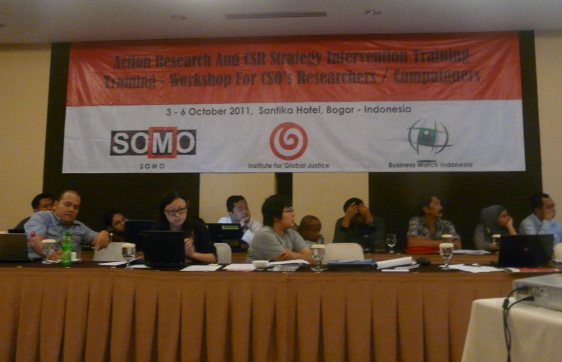
SOMO training on action research and CSR intervention
Do you ask for an official interview with company management or do you confront them with your findings on working conditions? Is it possible to get companies moving if you put pressure on them through the international media? These and other questions were treated during a training on ‘CSR strategy and action research’ for Asian NGO’s. Together with the regional partners, Institute for Global Justice (IGJ) and Business Watch Indonesia (BWI), SOMO conducted this training at the beginning of October in the Indonesian city of Bogor.
“Civil society in Southeast Asia seems to be growing, which is good”, says senior researcher Sanne van der Wal who, together with Roos van Os, researcher on trade & investments, conducted the workshop. “Approximately 30 social organisations from Indonesia, India, China and the Philippines participated in the two day workshop. They included big NGOs such as the Indonesian Friends of the Earth (Walhi) and the national trade union federation but also smaller trade union organisations and NGO’s.”
Action research provides NGO’s with possibilities to influence Corporate Social Responsibility policies of companies, based on information. In order to be able to make successful CSR interventions, it’s important for NGO’s to consider their roles. Do they act as watchdogs, monitoring developments and disseminating the results thereof? Do they want to initiate partnerships with companies to be able to influence their policies directly or to participate in their implementation? Or do they participate in initiatives such as roundtables, where other stakeholders, such as funders, consumers and other NGOs participate as well?
Fig leaf
Van der Wal: “In each role you have to avoid pitfalls. Do you have enough capacity to be a watchdog? And, if you initiate a partnership, don’t they have you on a string, aren’t you abused as a fig leaf, while nothing changes in the company?”
Van der Wal and Van Os also trained participants on developments connected to corporate social responsibility in international companies. “Within multinational companies and their supply chains, we see a diversity of policies which can have different impacts on different company levels, departments and supply chains.”
Van der Wal and Van Os received enthusiastic feedback. “The reactions indicated that we shared useful knowledge and insights to the participants and that they are confident that they now have more possibilities to attain their organisational goals. To illustrate some organisations see possibilities to use complaint procedures or chain analysis as a tool whereas they were largely unfamiliar with them before.”
Spontaneous
Three strategic partners, Civil Initiatives for Development and Peace in India (Cividep), IGJ (Indonesia) and the Philippines Action for Economic Reform (AER) presented a spontaneous plan to research and compare working conditions in their respective export processing zones. Van der Wal: “We have indicated in the training that we might have possibilities to fund a well elaborated proposal. I’m looking forward to their final proposal.”
Partners
-
Cividep India – Civil Initiatives for Development and Peace India
Related news
-
 CSDDD Datahub reveals law covers fewer than 3,400 EU-based corporate groupsPosted in category:News
CSDDD Datahub reveals law covers fewer than 3,400 EU-based corporate groupsPosted in category:News David Ollivier de LethPublished on:
David Ollivier de LethPublished on: -
 Additional evidence filed against Booking.com for profiting from illegal settlementsPosted in category:News
Additional evidence filed against Booking.com for profiting from illegal settlementsPosted in category:News Lydia de LeeuwPublished on:
Lydia de LeeuwPublished on: -
 The hidden human costs linked to global supply chains in ChinaPosted in category:News
The hidden human costs linked to global supply chains in ChinaPosted in category:News Joshua RosenzweigPublished on:
Joshua RosenzweigPublished on:

